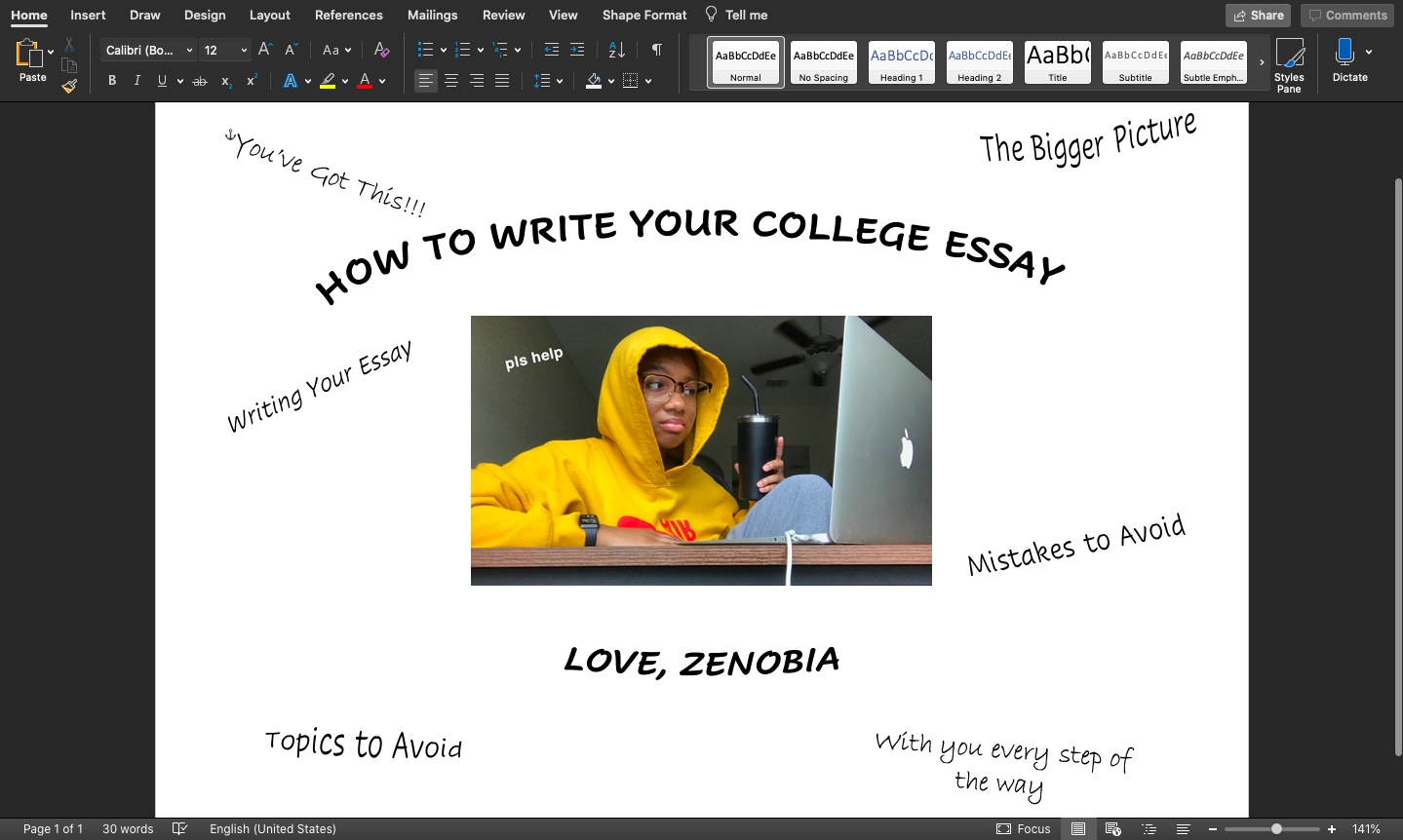How to Write Your Personal Statement Essay
There's so much to balance senior year, and college applications on top of everything can be tough. I hope this helps!
September 16, 2020
I understand there are so many “Do’s,” “Don’ts,” and “Consider this’s” about writing a college essay. There are also a variety of places to get this information, so I’ll make it easy for you and put it all in one article! As I type this, I’m reminding myself of my own research, so we’re pretty much in this together. Taken from both professionals and YouTubers who were accepted into Ivy Leagues, I’ve compiled the best information I found while figuring out how to write my essay and will take you on a step-by-step through the process.
Please note that this is specifically for your personal statement essay, I’ll do a separate article on supplemental essays soon.
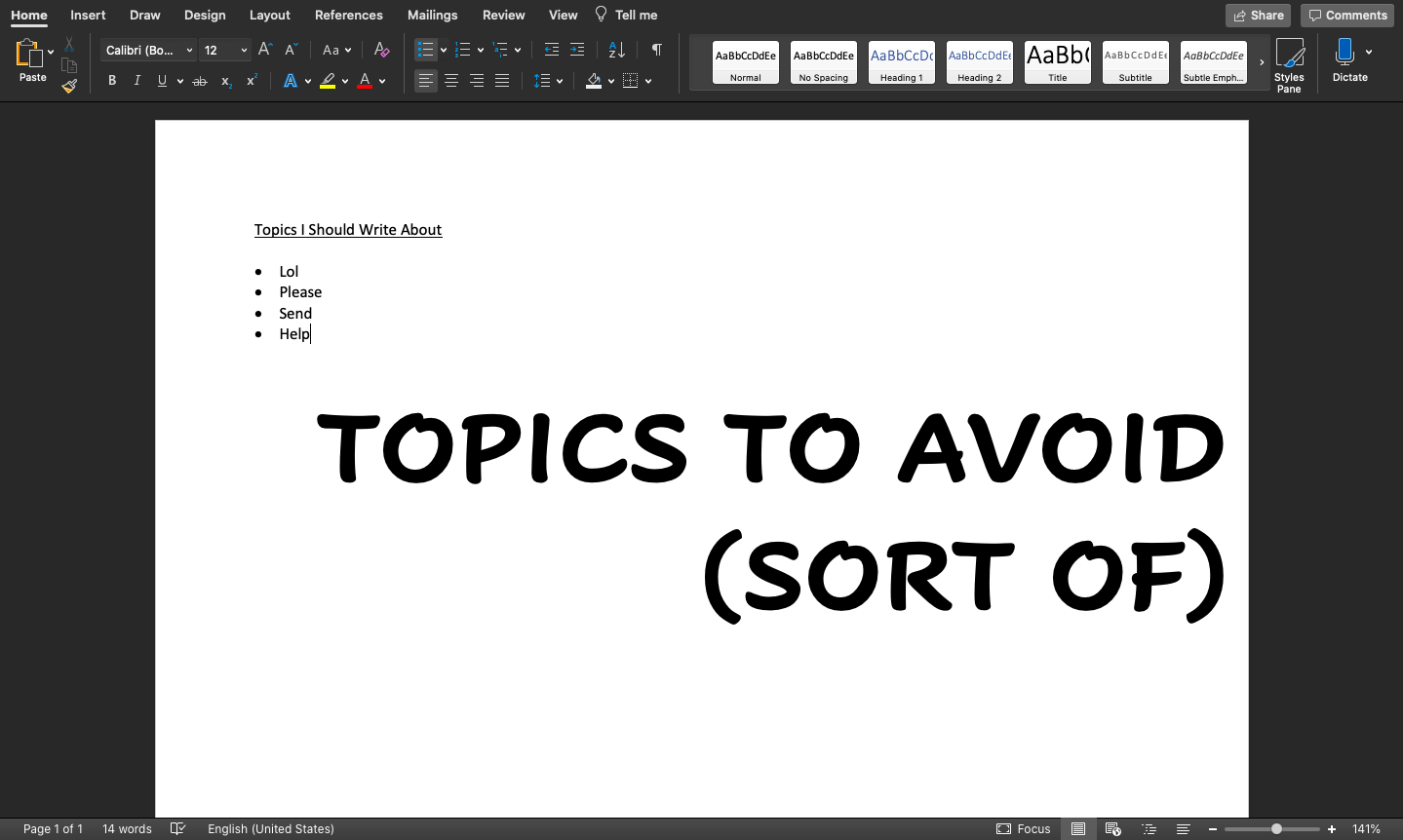
Topics to Avoid (Sort Of)
Thinking of a topic to write about is arguably harder than actually writing the essay. As we brainstorm, here are some tips to keep in mind.
Disclaimer: It is OKAY to write a “stereotypical” essay, people write about these things so often because it’s easy to write them well! If you can make it into something beautiful, do so. The goal is to give admissions officers something unique and interesting.
The Most Common College Essays
(Source: The Kath Path, Stanford undergrad student, owns an editing business)
While they aren’t necessarily bad, these topics are some of the most common essays admissions officers see. The goal is to stand out, so unless you can make a phenomenal story with an execution that is not stereotypical, it’s recommended you stay away from these. Please don’t delete that draft you started if you see your topic on this list though! I’ll also include the top tips given for writing these in a way that works in case you decide to choose one of them.
1. Multicultural Background Essays
AKA, I moved around a bunch and never really fit in. Through the struggle of making friends and visiting new places, I learned it’s great to be different and that I’m super *confident*. Or, I moved to Japan and now I see the world so *differently*. NO!
Top Tip: Admissions officers see this story so much, you need to bring something new to the table! They want to hear about how when you were living in Siberia you befriended a Shaman, and she inspired you to learn how to use herbs to create medicines. Since then you’ve worked your way up to selling natural medicines as a side hustle and it’s the reason you’re majoring in Herbalism. IDK? Give them something. Avoid the cheesiness/clichés, be true and unique to yourself.
2. Struggling to Win a Competition Essays
This is the: I was in a [insert type here] competition, my group and I went through [insert amount] setbacks and challenges, but we worked together to come out on top and won 1st place. Now I understand the importance of teamwork!
… Right.
Top Tip: Normally the people writing this essay were the leaders of their group. Don’t make it seem like you’re above it all. Everyone likes humbleness, universities and colleges want to know that you’re able to work with people without being problematic.
3. [STEM, etc.] field: My Emotional Savior Essay
When going into a field that is seen as “boring, uncreative, bland,” etc., students will talk about how this is their LIFE. It’s their creative outlet, and they have a strong emotional connection to it, and they wish the world could see it how they did. Now listen, nobody is saying that this isn’t true. For the majority of people going into these types of fields, they really do see it as a creative outlet and appreciate them for what they are. That’s beautiful, really! You just have to go about telling your story correctly.
Top Tip: One of the most common errors for this essay is forced metaphors to make your story more *spicy*. Math is not like a rainbow, and you’re a leprechaun. Don’t even think about it. What made you want to go into the field? Simple as that.
4. An Intense Sports Moment (Surprising, I know)
Whenever this type of story is written, people often write narrative style. “With sweat drenching my clothes, I watched the court with bated breath. Thirty seconds left.” Ma’am, this is a McDonalds drive-thru. I understand, you pushed yourself physically and learned emotionally from it. But… (see below)
Top Tip: Don’t over-describe the details, you’re not writing a book! Avoid just take up word space, really convey how this particular moment helped you learn something about yourself, or you did something you never thought you could in the heat of the moment. You can get this point across without writing as if you’re getting published. Analysis > Example.
5. The Generic Leadership Essay
First of all, I’m so proud of you! You started a business, or a club, or an organization. You did the research, went through all the paperwork, built a website and a team, solved this and that problem… I’m losing my breath here. That’s fantastic. No one is saying this is a bad essay. The issue here is that everyone chooses the same structure:
I saw a problem -> I wanted to fix said problem -> I struggled -> I had to [insert hard work here] -> I started it -> The End!
Top Tip: Do your best to choose a more unique structure in order to make this as personal and impactful as possible.
6. The Rebelling Against My Parents Essay
Here’s an example: I’ve always had a passion for social studies, but my parents want me to be a lawyer. This is why they want me to do this, this is why I want to do that. TURNING POINT! I rebel, they begin to understand how important social studies is to me, and we come to a mutual agreement.
Top Tip: A lot of the time people spend way too much time talking about their parents and not themselves. They don’t need individual paragraphs, they need like two sentences. Talk about the emotional experience of being held back and deciding to rebel boldly/in secret.
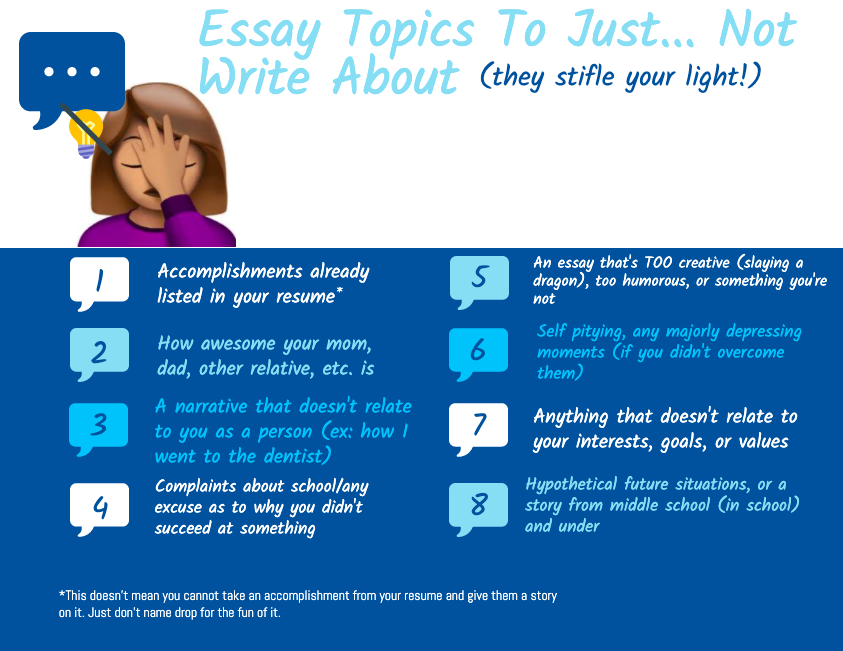
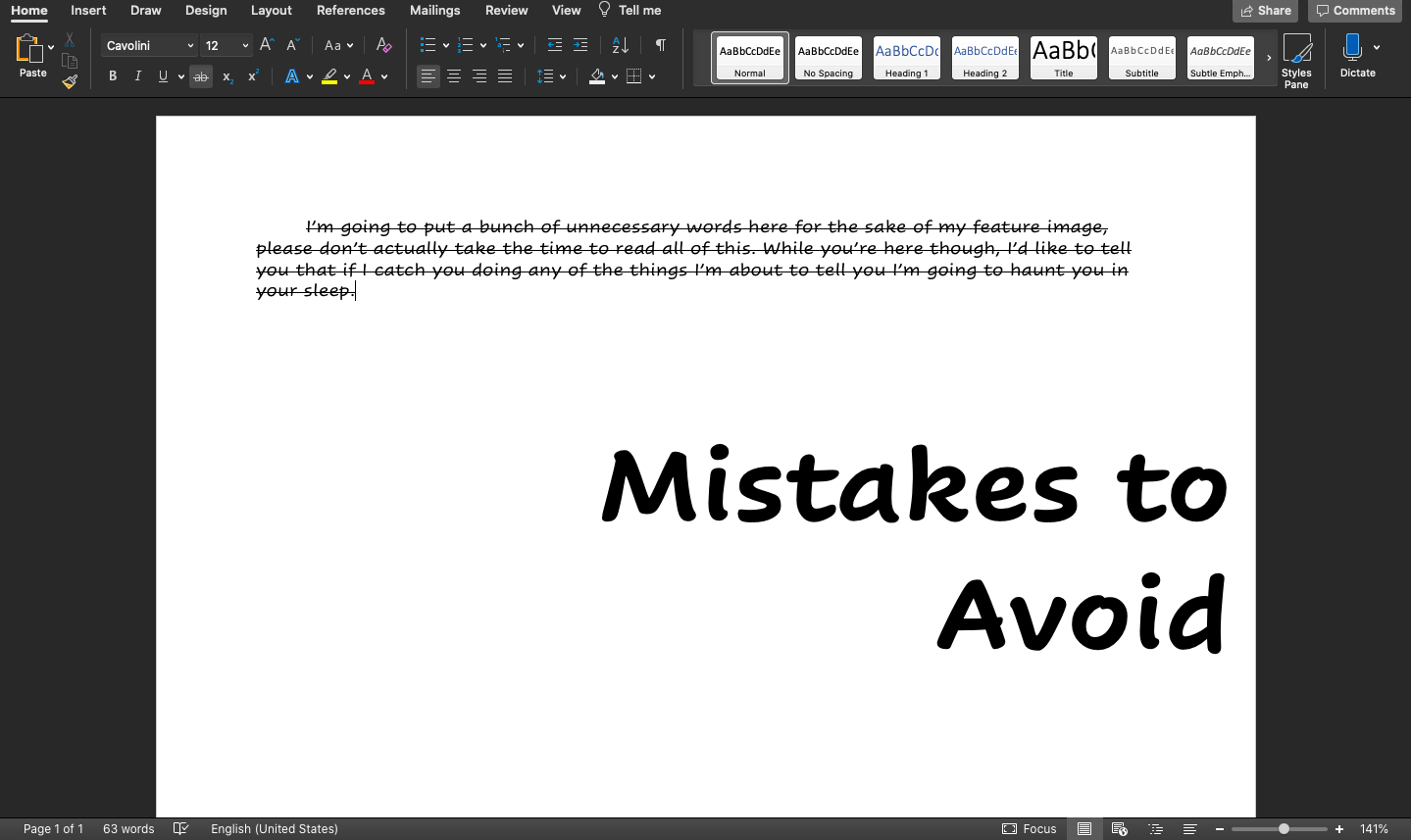
Mistakes to Avoid
Okay, so hypothetically speaking, we’ve picked the topic. Now as we’re writing, what are some specific mistakes we should avoid?
14 Common mistakes to Avoid When Writing Your Essay
(Source: Haley Kang, UPenn undergrad student, has edited 100+ essays)
These aren’t in order of importance; however, I’ll place a certain amount of “*”s next to the mistake depending on how much of a no it is.
1. DON’T WRITE ABOUT THE PANDEMIC******
… No. NO.
Especially if it’s for self-reflection. This will probably be the #1 topic used in America for 2021 applicants, I promise you won’t be unique at all.
Furthermore, there are so many people who probably have it so much worse (and if you are one of those people, it’s not the best topic to choose unless there’s a positive change that comes from your hardship).
There are many other topics to choose from. Avoid this at all costs.
2. Don’t add a meaningless metaphor just for the sake of adding one, and make sure it’s not cliché*
Don’t bring out some complex metaphor in the introduction of your essay… and then never elaborate on it or bring it back until your last two sentences.
This comes off as forced, like you’re just throwing things out there to make your essay more interesting. It’s really irritating to the readers. If you’re going to use one, it needs to be significant and able to be integrated throughout your essay.
You should also make sure it isn’t cliché. The metaphor should be personal to you, don’t just use one because it sounds good, especially not the common ones. Go google “unique metaphors” if you have to.
3. Don’t make direct statements*
This means sentences like, “This taught me…” or “I learned…”. Don’t just tell them about it, you need to show them through the writing in your essay. If you need to use this to get your point across, then your essay probably isn’t personal enough.
4. Lack of a catalyst**
If you’re using a personal transformation narrative, don’t say “I changed” and leave it at that. It isn’t believable that you just became better overnight. Explain the process of how you went from point A to point B.
Side note: The catalyst should be you. Your essay should come down to you being the source of your personal change! Don’t just say, “My fish died. It caused a change in me and that’s why I’m so organized.” Um.. how did we get there?
“My fish died because I was irresponsible, and I made the decision to be more organized so something like that never happens again.”
Ooh, okay. (Please don’t talk about how your fish dying made you more organized… I mean unless your fish actually died, my condolences.)
5. Don’t take the focus off of you!******
DO NOT. AT ALL. EVER. This is your college essay, for you. To get you into college. You. Have I said you enough?
Do not spend half of your essay talking about someone, some place, some thing that isn’t you. I get your mom is amazing, but admissions officers don’t care about them. Tell them about how amazing you are, you’re the one that has to attend!
Be narcissistic, it’s okay this one time. Nobody besides you should get more than 3 sentences.
6. Don’t use descriptions and adverbs excessively***
I promise it won’t make your essay sound more “college-like”, or intelligent. It’s just weird, honestly. They don’t say anything more about you, they’re just fillers.
Be descriptive when you feel it’s important, for sure. When they’re needed, they’re really needed. But if you’re eating breakfast, just say that. No one needs to know that you hungrily ate the crisp sourdough bread.
7. Don’t repeat the same idea over and over.*** (Top 3 most common mistakes)
Every sentence should be essential, and bring something new to your essay. Don’t say it again in a new way for the sake of being “descriptive”.
Don’t repeat the last sentence of the previous paragraph as a transition either! You don’t need to connect your paragraphs like a high school English essay.
Side note: I’m not saying bring something new as in multiple ideas. There is such a thing as introducing too many different ideas into your essay. It isn’t about how many you have, it’s about how well you develop them and connect with the readers.
8. Don’t ask rhetorical questions*
A common habit of students is to overuse rhetorical questions. They’re a waste of words and deflects the focus of essay away from you. They tell admissions officers nothing more about you as a person.
9. Don’t use quotes*
99% of the time, it doesn’t matter where it’s from. You, your parents, a unicorn, it doesn’t matter. Essays aren’t a script, adding quotes disrupts the flow of your narrative and sounds choppy.
There is a 1% though! If the quote you want to use isn’t that widely used, means something to you, and meant something to you before you started this essay, go for it. Just make sure you truly integrate it into your essay and make it known that it’s important to you.
10. Don’t force your beliefs on people****
Let me start by saying it is okay to have a personal identity that is tied to a religion. I have nothing against anybody for anything, if who/what you worship makes you happy, then I’m happy too!
However, trying to tell Admissions that “God opened my eyes and allowed me to see how I was treating people, so I changed” will not work out well for you.
If you so choose to take this path, which is already risky might I add, do not word it in a way that revolves entirely around your God(s, prophets, etc.). Everyone does not share your beliefs, remember that.
12. Talking about things you haven’t done yet***
If you’re currently failing three classes, have no motivation or happiness, and/or just making a whole bunch of mistakes in life… Please don’t tell your school. Especially not to say that you’re going to “get better with time”, or “work on it in the future”.
Admissions is not your therapist, putting all your cards on the table in this way does not make you look more honest and genuine. All anyone will think is “Why didn’t you make these changes earlier? Why aren’t you already improving?”
They’re looking for how you will contribute to the school, and this will likely reflect poorly on you.
13. Don’t use false misconceptions*
I.e., ‘contrary to popular belief,’ and then proceed to talk about something no one actually believes. It’s unnecessary.
14. Don’t use “you”*
There’s not much to say about this one, it’s simply not built for a college application essay because it’s not very professional.
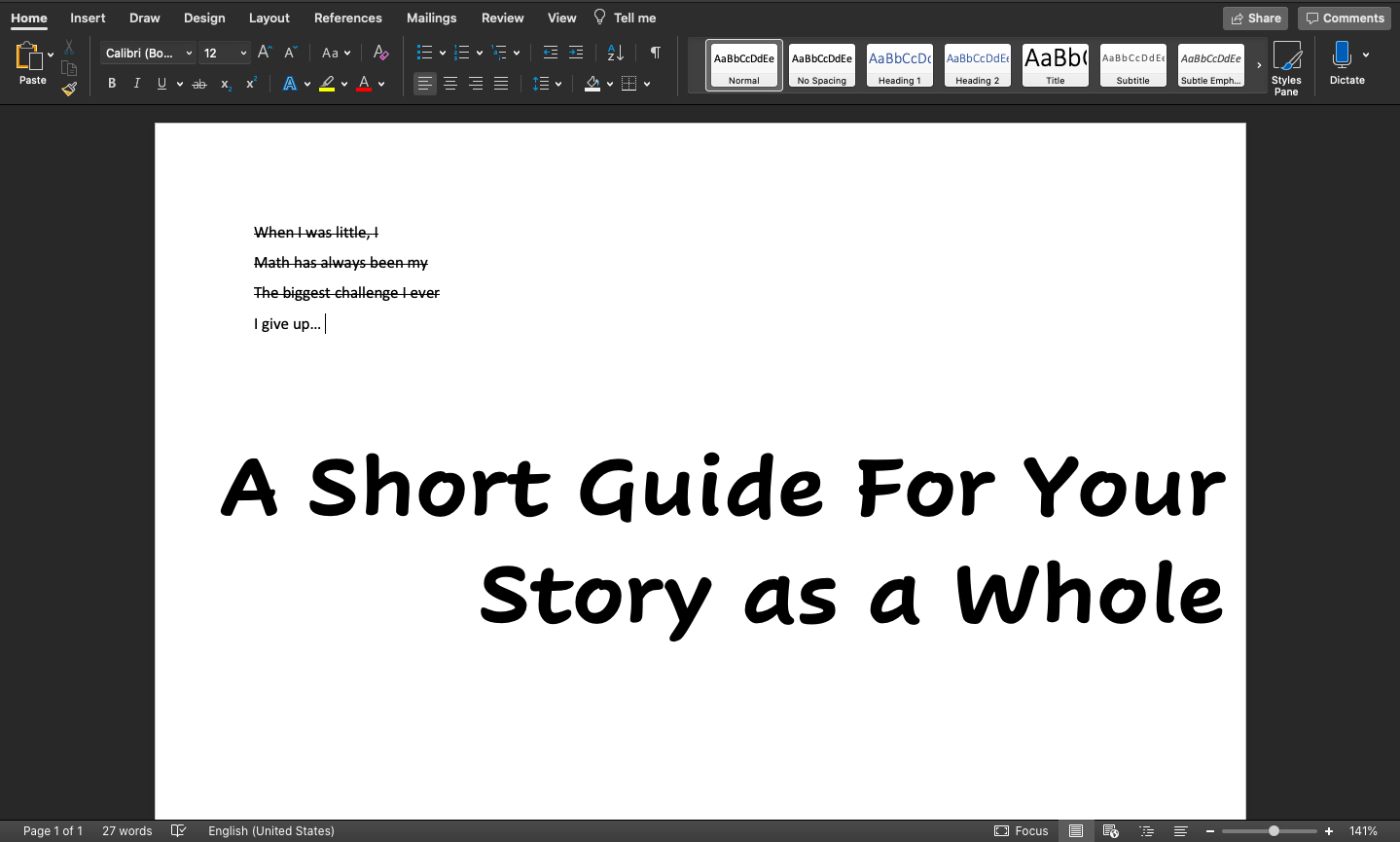
The Bigger Picture
Finally, we get to the “Do’s”! These are some broad tips to keep in mind, like the foundation being laid down before we start building a house.
A Short Guide for Your Story as a Whole
(Source: College Essay Guy, Nationally Recognized College Essay Expert, author)
Now that we know what not to do, let’s get to what we should! I’d like to lay out some basic tips before getting into anything else.
1. Don’t spend too much time obsessing over which prompt to use
(Disclaimer: I’m applying through Common App, where there are multiple prompts to choose from for the personal statement. I’m unsure what other application websites are out there, and the differences they have in regards to the prompt(s). If this doesn’t apply to you, don’t worry about it!)
Admissions officers aren’t concerned at all about which prompt you choose. What they want to know is: 1. Can you write, as well as 2. What will you add to their school?
2. Don’t worry too much about what “they” want
Of course you want to present yourself in a positive light to the people reading your essay, but don’t base it off of what you think they want to hear. This should come straight from you, and be as genuine as possible.
As College Essay Guy says, it’s like getting dressed in the morning and thinking, “Should I wear a red shirt because I like red, or should I wear a blue shirt because statistics show more people like blue?” (we don’t actually know this lol). This is problematic, don’t do that to yourself.
3. Consider being vulnerable
By the end of your essay, the readers should feel closer to you, like they know significantly more about you as a person. Some of the best essays have this quality in them. There are multiple ways to be vulnerable, so don’t feel like you have to tell them about your darkest moments in life in order to have a great essay!
a) Reveal something about yourself you might be judged for, like a mistake you made in the past (it should have a positive outcome, don’t be negative)
b) Reveal something about yourself that’s in conflict with another part of you. Maybe your life has always revolved around playing it safe, and that’s what you’re comfortable with. However, what people don’t know is that you have a secret love for riding motorcycles, and the spontaneity and adventure that comes with it. You get the gist, right?
c) Geek out on something you love! I love art, and a lot of the time I’ll see the world through a painter’s eye. My music playlists are organized by colors, I always tie emotions to colors, honestly I just believe everything in life can be tied back to colors. I could go on and on about it forever, don’t get me started.
4. Examples and Insights (an extension of #3)
Always give examples—imagery that attests to your personal qualities. In addition, you should provide insight into the importance of your example, aka a “so what” moment.
For example, you love to up-style shoes. So what? Because it takes a rather generic product, and turns it into something made just for you. Oh wow, now I know that you pay attention to detail and aesthetic is important to you.
Examples show writing ability, and insight shows critical thinking. Wonderful things to present to your admissions officers!
5. Use all 5 senses to engage the reader’s imagination
This is not to cancel out what I said earlier about providing too much detail. Remember this tip when you’re bringing up important aspects of your story. If I wrote my essay on my love for poetry and decided to share the memory of writing my first, I’d place the readers in the environment with me. Before talking about how it made me feel and how I’ve grown as a writer since then, I’d introduce it in a way similar to this:
“I remember writing my favorite poem like it was yesterday. I sat at my desk wrapped in a fuzzy blanket, a large mug of green tea in my hand. The rain danced against the window as my notebook’s creamy pages stared at me.”
The detail in this recollection shows how important this particular poem is to me, and engages all five senses. The reader can see the creamy pages, hear the rain, smell and taste the tea, feel the blanket. Everything works together.
6. The ending of your essay should feel slightly unexpected, yet inevitable
I know this sounds contradictory, but let me explain. Don’t introduce your ending at the beginning of your essay like a thesis statement. We should slowly get to the conclusion, in a way that we can kind of see where you’re getting at, yet we haven’t gotten a clear answer yet.
Remember when I used the Herbalism example in the first chapter? “When you were living in Siberia you befriended a Shaman, and she inspired you to learn how to use herbs for different purposes. Now you sell natural medicines as a side hustle.” The reader will probably be able to sort of understand where you’re headed, but there’s nothing to confirm it just yet.
This is the type of journey you should take, don’t let the reader know you want to be an Herbalist by the third sentence. Make them work for it!
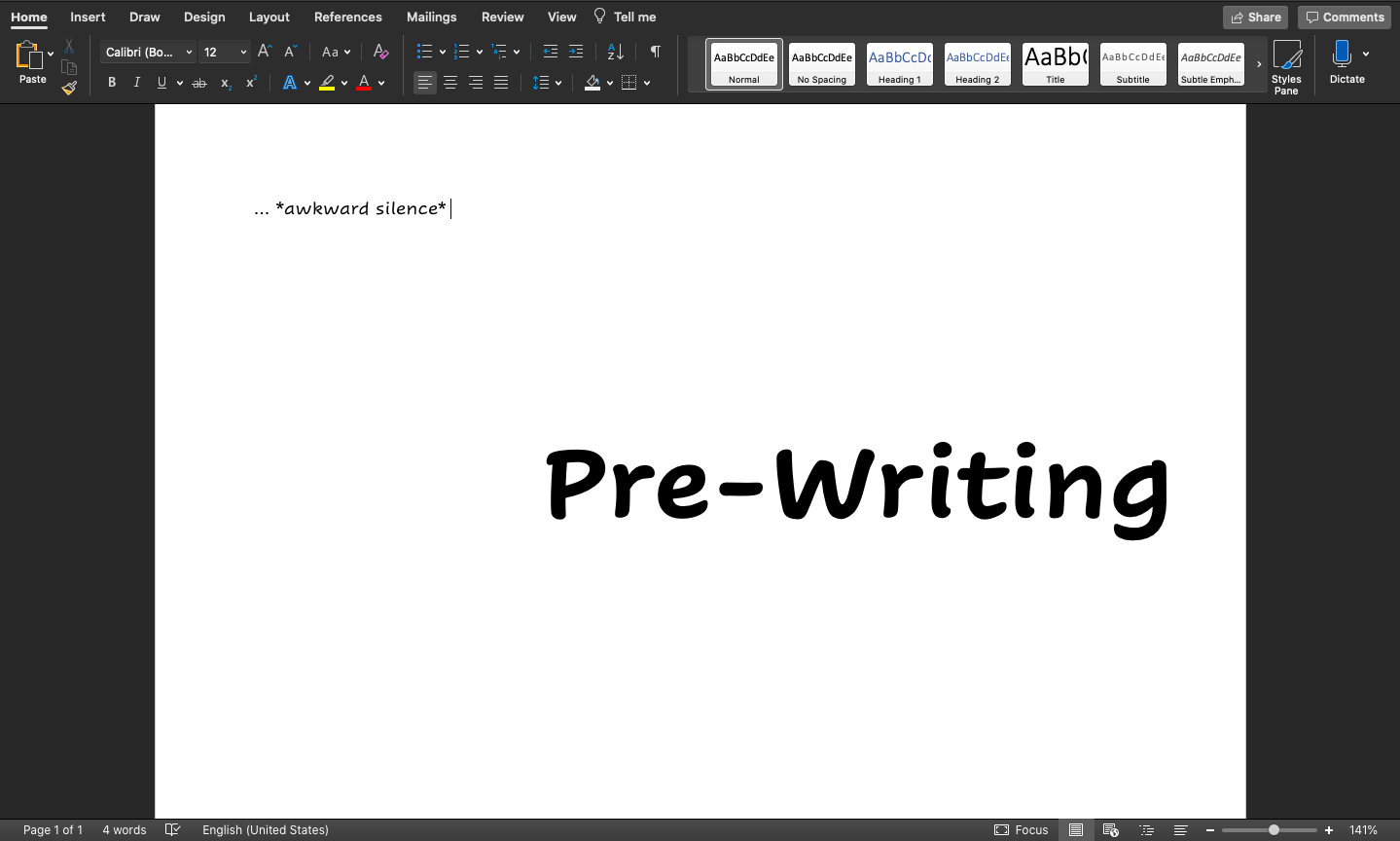
Pre-Writing
Wow, I can’t believe you’re still here. I love you, you’re great. Let’s continue! How do we go about actually typing words on the screen?
A Few Quick Tips While You’re in the Pre-Writing Phase
Partial Source: Shemmassian, Academic Consulting
So we know what to avoid and we have an outline of what our essay should look like. It’s like 9pm (it’s literally almost 9pm right now), we’re in front of the laptop screen, and the cursor is blinking at us. How do we go about this rough draft?
1. Start early
I don’t care if you’re applying regular decision and your application isn’t due until like, February. Start in October or earlier. If you’re applying early decision, you need to start now if you haven’t yet. I’m so serious.
Give yourself time to really come up with a good topic to write about, time to break up your essay into sections if you must, and especially time to revise, edit, and have other people read it.
2. Lists are your best friend
No matter what the prompt is, make a list for it if you don’t have an automatic thought that pops into your head in the first five seconds, and no more than that. If the topic isn’t so significant that you hear it in your head that fast, you should pull up options.
If it’s an identity prompt, make a list of hobbies, sports, memories, etc. in your life that you believe were significant in shaping you into the person you are today.
If it’s a challenge/setback/failure prompt, think about yourself as a person and the mindset you hold. Make a list. Has this mindset been shaped by moving schools, a disability, or a mental health issue? How did you overcome/how are you overcoming this setback? There are many options, everyone is different. Make a list.
If it’s a questioned/challenged a belief/idea prompt… honestly there aren’t too many of these unless you’ve just been in these situations a lot. MAKE A LIST.
I’m sure y’all get the point so we’ll move on.
3. Try starting from the end and working your way back up
This doesn’t work for everybody, however some might find this helpful. In this case, think of it like writing a very lopsided English essay. Figure out the point you want to get across, and write the conclusion of your essay from that (because remember, you’re not writing your “thesis” in the beginning).
Once you’ve written that conclusion, think about how you want to address the point. A specific memory, a timeline of how you came to love something, etc. Think about the details you want to share, and write your “body paragraphs” from that.
After you’ve finished all of that, you can determine how you’d like to introduce this topic. Now this is easier said than done, but very effective. I’d personally do this if I truly had no clue how to start. It requires you to think harder, because you’re connecting everything from the bottom up and breaking it all into sections, rather than writing from beginning to end.
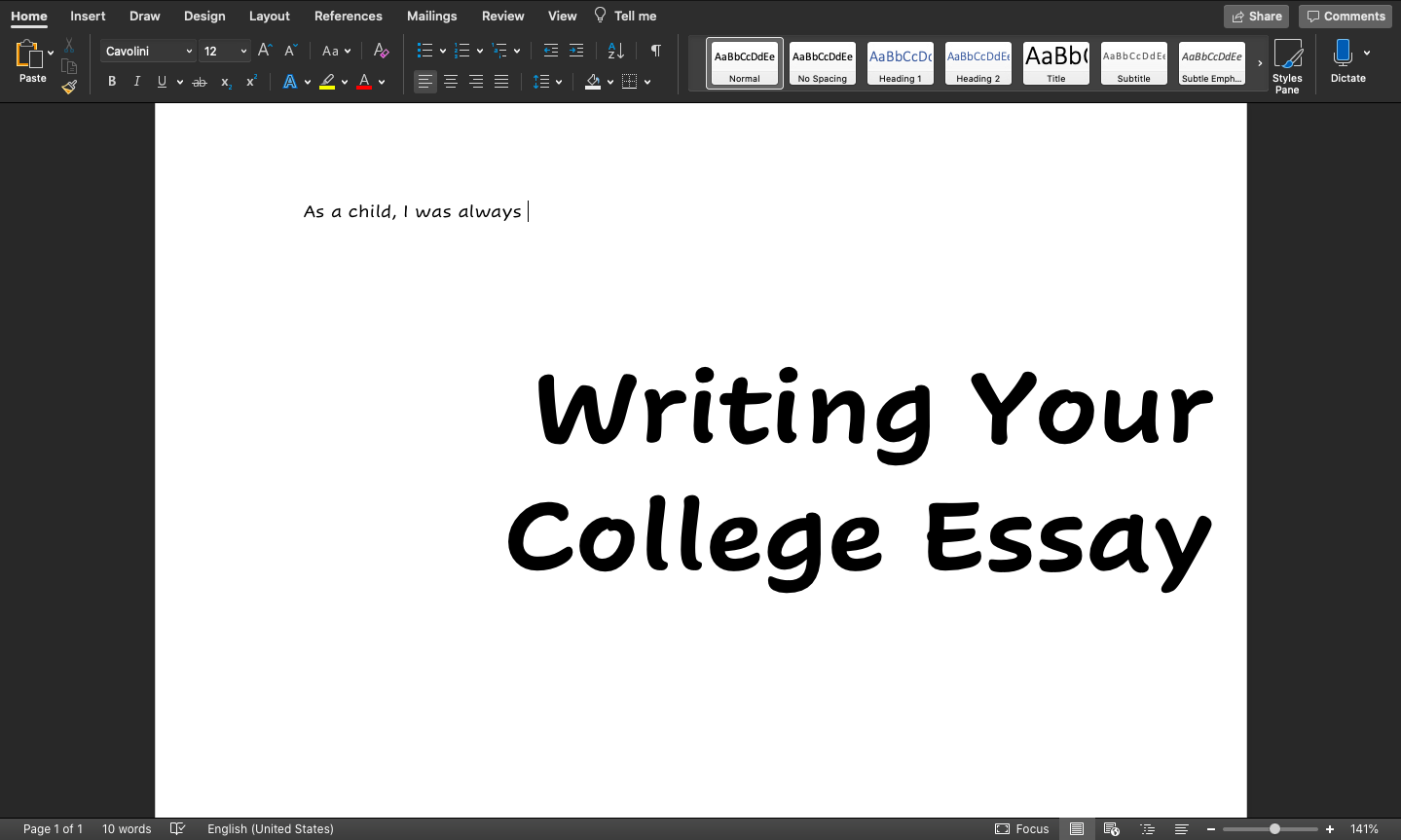
Writing Your College Essay
I just want to say that I’m so, so proud of us right now. We’re actually about to write our essay for real.
It’s funny, the title of this article is “How to Write Your College Essay”, and yet there will be no list of tips here, no source, just me. Sorry to disappoint, but what you might not realize is that I’ve given you all the tips you need to begin.
I’ve told you what to avoid, what to approach, and how to go about brainstorming. Actually writing the essay is entirely up to you, no one else can tell you what works best for you besides yourself. There are so many different essay formats and styles of writing, so start anywhere and go with the flow.
I recommend not letting anyone else see your essay until it’s complete, because you don’t need any outside sources bringing their opinion into your personal statement. You’re the one that has to attend the college, not them.
Once you do finish, your parent(s), any family members who are good with writing, mentors, that one cousin in grad school, your English teacher… everybody needs to read this essay.
I am not saying they need to read it for editing & revision. Honestly, besides your English teacher I wouldn’t ask anybody to look over your essay for that purpose. Your teacher can look at it without bias and simply tell you what errors should be fixed, leaving it at that.
You want to know if your story sticks with people, how it impacts them. Ask them to picture themselves as a stranger, and tell you if they feel as if they know you better. Ask them if they were entertained, because if you do nothing else, entertain the reader. Admissions officers have to read thousands of essays, and 90% of them are bland. Be the 10% that’s interesting.
Ask them to sum up your subject in one sentence. If you branded yourself correctly, their answer should satisfy you.
Okay… I think we’re all done here.
I feel like we’ve grown so close since the beginning of this article. You’re all ready to go now, oh my goodness I’m going to cry. I’ll miss you so much.
The biggest thing to remember is to trust yourself. You have to trust yourself. If it’s any consolation, I trust you.
I’m going to go finally start my essay as well now, I’ll see you on the other side. Best of luck to us!
Love, Zenobia
(Psst, I’m back. If this still wasn’t enough, I thought I’d mention that I edit finished essays for $10!
If you prefer to recieve guidance on the way, I understand. $15 and I’ll walk you through each step, counseling you until it’s finished. My email is wileyzenobia@gmail.com.)
